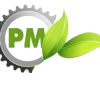
Firms choose to use the PM process over other metal manufacturing for two main reasons. The first is when parts are difficult to manufacture by other metal processes. PM allows for production of parts containing tungsten, molybdenum, or tungsten carbide. PM also produces porous bearings and filters and can achieve soft or hard magnetics. These products are difficult and expensive to produce with other metalworking processes. The second reason firms choose PM over other manufacturing process is its cost-effective advantage. Casting, forging, and machining components are costly and use more material than PM to make the same part.
The PM process serves many industries with the automotive industry being the largest PM consumer. Other industries include, but are not limited to, industrial motors, medical applications, controls, hydraulics, household appliances, aerospace, and hand tools.


